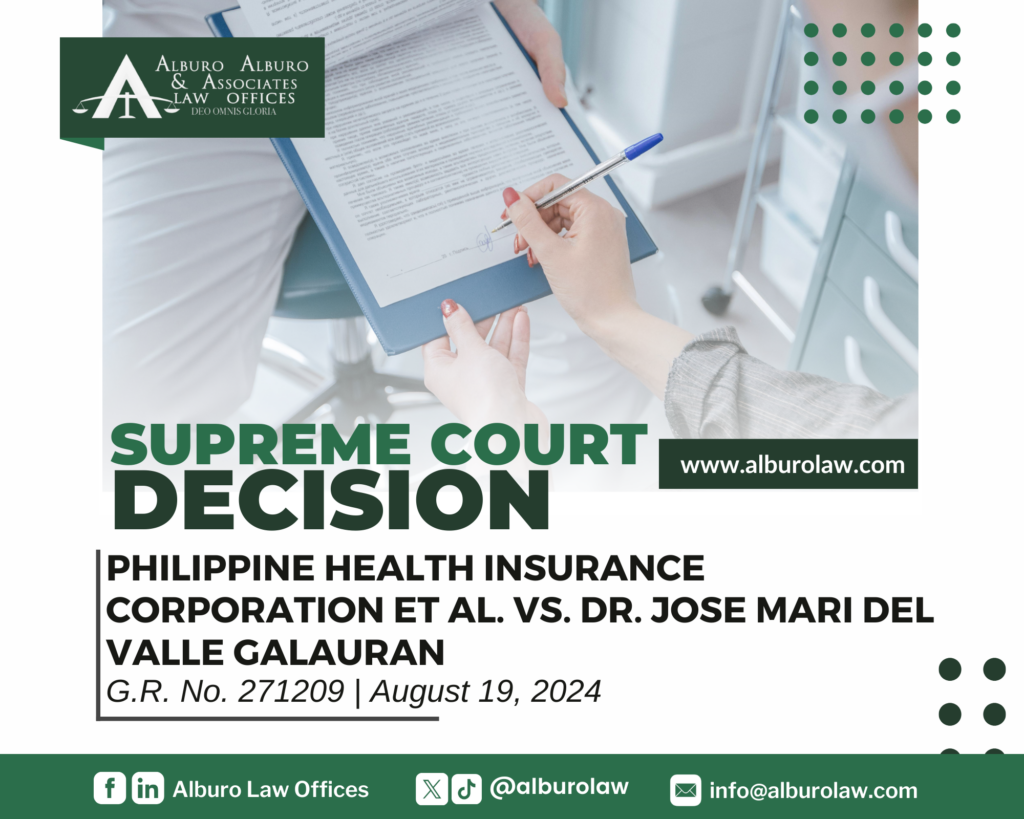
Photo from Pexels | SHVETS production
The following post does not create a lawyer-client relationship between Alburo Alburo and Associates Law Offices (or any of its lawyers) and the reader. It is still best for you to engage the services of a lawyer or you may directly contact and consult Alburo Alburo and Associates Law Offices to address your specific legal concerns, if there is any.
Also, the matters contained in the following were written in accordance with the law, rules, and jurisprudence prevailing at the time of writing and posting, and do not include any future developments on the subject matter under discussion.
AT A GLANCE:
The Supreme Court ruled that the PhilHealth Board, not the PhilHealth President CEO and Vice President, is vested with the authority to withdraw or revoke an accreditation. Thus, PhilHealth acted arbitrarily and unlawfully when it revoked Dr. Galauran’s accreditation.
The Court emphasized that the basic application for accreditation is separate and distinct from the withdrawal or revocation of accreditation. While the basic application for accreditation can be resolved by the PhilHealth President and CEO, only the PhilHealth Board, exercising its quasi-judicial power, can act on the withdrawal or revocation of accreditation.
Facts:
PhilHealth issued Corporate Personnel Order No. 2018-1802 dated August 17, 2018, which authorized the Fact-Finding Investigation and Enforcement Department (FFIED) to conduct spot inspection and claims validation within Regions IV-A, NCR, and Rizal.
WellMed Dialysis and Laboratory Center Corporation (WellMed) was one of the medical centers subjected to a spot inspection and claims validation. According to the FFIED, WellMed filed false claims for patients who were already dead, and still received out-of-pocket payments from dialysis patients or members without issuing the corresponding receipts for their treatments.
Among these anomalous claims was for the out-patient hospitalization and dialysis sessions of PhilHealth member Bebian Morte Albante (Albante) even after Albante had already passed away.
Allegedly, it was Dr. Galauran, on behalf of WellMed, who certified that Albante underwent dialysis sessions after he passed away. Thereafter, the FFIED charged Dr. Galauran for (1) misrepresentation by false or incorrect information under Section 162; and (2) breach of the warranties of accreditation/performance commitment under Sec. 163 of the Revised Implementing Rules and Regulations (RIRR).
As a result, PhilHealth sent a Letter informing Dr. Galauran that his accreditation was withdrawn effective from the date of notice. Dr. Galauran contested the charges through a Letter and sought reconsideration of the withdrawal of his accreditation. The PhilHealth President and CEO denied the appeal of Dr. Galauran for lack of merit, and stressed that “the accreditation process is separate and distinct from the quasi-judicial process in PhilHealth.”
Issue:
Whether Dr. Gaularan’s accreditation was revoked arbitrarily and without lawful authority by the PhilHealth President CEO, as well as the Vice President.
The Supreme Court’s Decision:
The Supreme Court ruled that the PhilHealth Board, not the PhilHealth President CEO and Vice President, is vested with the authority to withdraw or revoke an accreditation. Thus, PhilHealth acted arbitrarily and unlawfully when it revoked Dr. Galauran’s accreditation.
The Court emphasized that the basic application for accreditation is separate and distinct from the withdrawal or revocation of accreditation. While the basic application for accreditation can be resolved by the PhilHealth President and CEO, only the PhilHealth Board, exercising its quasi-judicial power, can act on the withdrawal or revocation of accreditation.
Section 75 of RIRR provides:
“SECTION 75. Quasi-Judicial Powers. – The Corporation, to carry out its tasks more effectively, shall be vested with the following powers:
xxx
xxx
- Subject to the respondent’s right to due process, to suspend temporarily, revoke permanently or restore the accreditation of a health care provider or the right to benefits of a member and/or impose fines after due notice and hearing. The decision shall immediately be executory, even pending appeal, when the public interest so requires and as may be provided for in this Rules. Suspension of accreditation shall not exceed six (6) months. Suspension of the rights of members shall not exceed six (6) months.”
Source:
Philippine Health Insurance Corporation et al. vs. Dr. Jose Mari Del Valle Galauran
G.R. No. 271209 | August 19, 2024
Click here to subscribe to our newsletter
Alburo Alburo and Associates Law Offices specializes in business law and labor law consulting. For inquiries regarding legal services, you may reach us at info@alburolaw.com, or dial us at (02)7745-4391/ 0917-5772207/ 09778050020.
All rights reserved.


